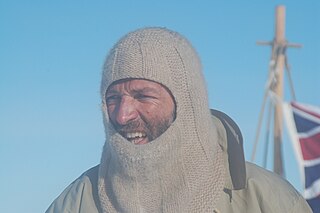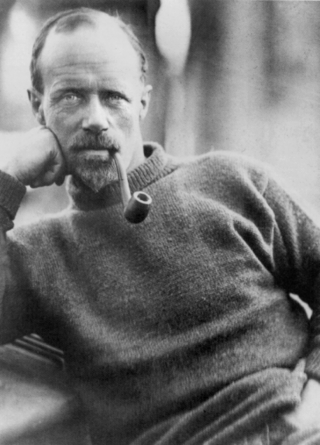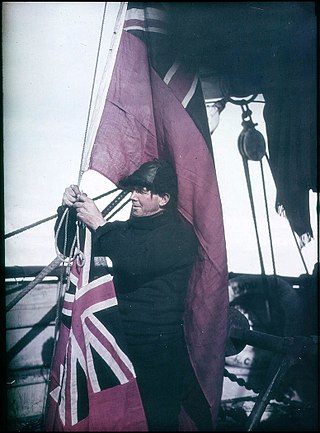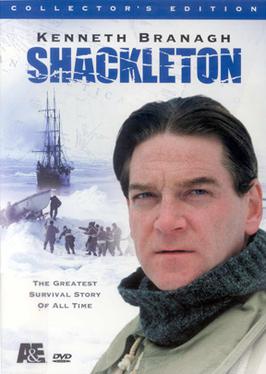
Sir Ernest Henry Shackleton was an Anglo-Irish Antarctic explorer who led three British expeditions to the Antarctic. He was one of the principal figures of the period known as the Heroic Age of Antarctic Exploration.

Elephant Island is an ice-covered, mountainous island off the coast of Antarctica in the outer reaches of the South Shetland Islands, in the Southern Ocean. The island is situated 245 kilometres north-northeast of the tip of the Antarctic Peninsula, 1,253 kilometres west-southwest of South Georgia, 935 kilometres south of the Falkland Islands, and 885 kilometres southeast of Cape Horn. It is within the Antarctic claims of Argentina, Chile and the United Kingdom.

The voyage of the James Caird was a journey of 1,300 kilometres (800 mi) from Elephant Island in the South Shetland Islands through the Southern Ocean to South Georgia, undertaken by Sir Ernest Shackleton and five companions to obtain rescue for the main body of the stranded Imperial Trans-Antarctic Expedition of 1914–1917. Many historians regard the voyage of the crew in a 22.5-foot (6.9 m) ship's boat through the "Furious Fifties" as the greatest small-boat journey ever completed.

George Tyssen Butler was a British filmmaker and photographer, and a pioneer of the theatrical documentary. Some of his most popular films include Pumping Iron (1977), which introduced a wider audience to Arnold Schwarzenegger, The Endurance films, retelling Sir Ernest Shackleton's saga of Antarctic survival, and Going Upriver: The Long War of John Kerry (2004), about his friend John Kerry's leadership in the peace movement.

Thomas Crean was an Irish seaman and Antarctic explorer who was awarded the Albert Medal for Lifesaving (AM).

The Imperial Trans-Antarctic Expedition of 1914–1917 is considered to be the last major expedition of the Heroic Age of Antarctic Exploration. Conceived by Sir Ernest Shackleton, the expedition was an attempt to make the first land crossing of the Antarctic continent. After Roald Amundsen's South Pole expedition in 1911, this crossing remained, in Shackleton's words, the "one great main object of Antarctic journeyings". Shackleton's expedition failed to accomplish this objective but became recognized instead as an epic feat of endurance.

Endurance was the three-masted barquentine in which Sir Ernest Shackleton and a crew of 27 men sailed for the Antarctic on the 1914–1917 Imperial Trans-Antarctic Expedition. The ship, originally named Polaris, was built at Framnæs shipyard and launched in 1912 from Sandefjord in Norway. When one of her commissioners, the Belgian Gerlache, went bankrupt, the remaining one sold the ship for less than the shipyard had charged - but as Lars Christensen was the owner of Framnæs, there was no hardship involved. The ship was bought by Shackleton in January 1914 for the expedition, which would be her first voyage. A year later, she became trapped in pack ice and finally sank in the Weddell Sea off Antarctica on 21 November 1915. All of the crew survived her sinking and were eventually rescued in 1916 after using the ship's boats to travel to Elephant Island and Shackleton, the ship's captain Frank Worsley, and four others made a voyage to seek help.

Timothy John Jarvis is an English and Australian explorer, climber, author, environmental activist, and documentary filmmaker. He is best known for his numerous Antarctic expeditions, particularly his attempted Antarctic crossing in 1999 and the period recreations of historical treks by Sir Douglas Mawson and Sir Ernest Shackleton.

Endurance: Shackleton's Incredible Voyage, is a 1959 book written by Alfred Lansing, about the failure of the Imperial Trans-Antarctic Expedition led by Sir Ernest Shackleton, in its attempt to cross the Antarctic continent in 1914.
Endurance is the act of sustaining prolonged stressful effort.

The NimrodExpedition of 1907–1909, otherwise known as the British Antarctic Expedition, was the first of three expeditions to the Antarctic led by Ernest Shackleton and his second time to the Continent. Its main target, among a range of geographical and scientific objectives, was to be first to reach the South Pole. This was not attained, but the expedition's southern march reached a Farthest South latitude of 88° 23' S, just 97.5 nautical miles from the pole. This was by far the longest southern polar journey to that date and a record convergence on either Pole. A separate group led by Welsh Australian geology professor Edgeworth David reached the estimated location of the South Magnetic Pole, and the expedition also achieved the first ascent of Mount Erebus, Antarctica's second highest volcano.

John Robert Francis Wild was an English sailor and explorer. He participated in five expeditions to Antarctica during the Heroic Age of Antarctic Exploration, for which he was awarded the Polar Medal with four bars, one of only two men to be so honoured, the other being Ernest Joyce.

The Ross Sea party was a component of Sir Ernest Shackleton's 1914–1917 Imperial Trans-Antarctic Expedition. Its task was to lay a series of supply depots across the Great Ice Barrier from the Ross Sea to the Beardmore Glacier, along the polar route established by earlier Antarctic expeditions. The expedition's main party, under Shackleton, was to land near Vahsel Bay on the Weddell Sea on the opposite coast of Antarctica, and to march across the continent via the South Pole to the Ross Sea. As the main party would be unable to carry sufficient fuel and supplies for the whole distance, their survival depended on the Ross Sea party setting up supply depots, which would cover the final quarter of their journey.

The Shackleton–Rowett Expedition (1921–22) was Sir Ernest Shackleton's last Antarctic project, and the final episode in the Heroic Age of Antarctic Exploration.

Henry McNish, often referred to as Harry McNish or by the nickname Chippy, was the carpenter on Sir Ernest Shackleton's Imperial Trans-Antarctic Expedition of 1914–1917. He was responsible for much of the work that ensured the crew's survival after their ship, the Endurance, was destroyed when it became trapped in pack ice in the Weddell Sea. He modified the small boat, James Caird, that allowed Shackleton and five men to make a voyage of hundreds of miles to fetch help for the rest of the crew.

Alfred Cheetham was a member of several Antarctic expeditions. He served as third officer for both the Nimrod expedition and Imperial Trans-Antarctic expedition.

Shackleton is a 2002 British television miniseries. It was written and directed by Charles Sturridge and starring Kenneth Branagh as explorer Sir Ernest Shackleton. The film tells the true story of Shackleton's 1914 Antarctic expedition on the ship Endurance. The cast includes Kevin McNally, Lorcan Cranitch, Embeth Davidtz, Danny Webb, Matt Day and Phoebe Nicholls as Lady Shackleton. It was filmed in the UK, Iceland and Greenland. The film used first-hand accounts by the men on the expedition to retell the story. Shackleton biographer Roland Huntford was a production advisor.

Dr Robert Selbie Clark was a Scottish marine zoologist and explorer. He was the biologist on Sir Ernest Shackleton's Imperial Trans-Antarctic Expedition of 1914–1917, and served as the director of the Scottish Home Department Marine Laboratory, at Torry, Aberdeen.

Shackleton's Antarctic Adventure is an IMAX film about the Imperial Trans-Antarctic Expedition led by Ernest Shackleton between 1914 and 1917. Directed by George Butler, the film was released in February 2001 and was narrated by Kevin Spacey. It documents Shackleton's journey aboard the Endurance and was the follow-up to Butler's previous film, The Endurance: Shackleton's Legendary Antarctic Expedition.

Charles J. Green, also known as Charlie Green, was a British ship's cook who took part in Sir Ernest Shackleton's Imperial Trans-Antarctic Expedition as the cook for the Weddell sea party on board the Endurance. The son of a master baker, Charles learnt to bake, but ran away at the age of 22 to join the Merchant Navy. At an unknown time in his life, Green had an accident which resulted in the loss of one of his testicles. This resulted in Green having a somewhat squeaky and high-pitched voice, which was the source of jokes amongst his fellow crew aboard the Endurance. Whilst in Buenos Aires on board the Andes in October 1914, he heard word that Shackleton had fired the expedition's cook, for drunkenness, and was subsequently hired. Green was described as "conscientious almost to the point of being single-minded" with a "frail" disposition.


















